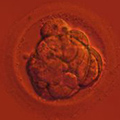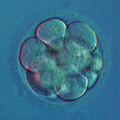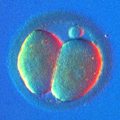Why PGD?

Preimplantation Genetic Diagnosis (PGD) is a set of techniques specifically developed to test the genetic background of preimplantation human embryos. In order for PGD to be performed, human embryos must be available for analysis prior to the implantation. Therefore, only parents undergoing IVF procedure can benefit from this technology.
Four major reasons for PGD
- One or both parents are the carriers of a single-gene disorder (Cystic Fibrosis, beta-Thalassemia, Tay-Sachs, etc).
- One of the parents is a carrier of a chromosomal aberration (translocation, inversion, deletion).
- A baby of a specific sex is desired by parents for family balancing, or because of a sex-linked genetic disorder, or due to some personal reasons.
- Aneuploidy screening (PGD-AS, or PGS) for the patients going through IVF infertility treatment, who wish to improve their chances for normal pregnancy.
For the first three groups, PGD provides the only alternative to recurrent miscarriages and abortions. It is only for the last group of patients, that the reasons for going through PGD are not so obvious. These are the patients of advanced maternal age (AMA, women over the age of 36), patients with recurrent pregnancy loss (RPL), and patients with failed IVF cycles. These patients have no known genetic disorders, but they wish to improve their chance for a successful IVF cycle. Currently the majority of PGD cases are performed for this group of patients.
Why do genetically normal parents select PGD?
Genetically normal parents produce genetically abnormal embryos in great numbers, and the evidence for this is disturbingly abundant:
- Thousands of babies with Down Syndrome are born in the US every year. About the same number of babies with lesser-known chromosomal disorders (Kleinfelter's, Turner's, Patau's, Edward's) are also born to genetically normal parents.
- At least 15-20% of all human fetuses end up as detectable spontaneous abortions. About half of these embryos abort because they are chromosomally abnormal. A chance in the 7-10% range for miscarriage due to genetic abnormalities is a serious risk, but this number still does not quite reveal the urgency for PGD.
- Failed pregnancies. This happens to every couple trying to conceive. According to some estimates, over 75% of all human conceptions abort before the first missed menstrual cycle. Thanks to PGD we know why this happens. By being able to test human embryos at the very first stages of development PGD reveals the magnitude of the pool of genetic abnormalities generated by humankind. On average, more than half of the embryos of an IVF patient in her mid- to late-thirties are genetically abnormal, or aneuploid. Nature, it seems, found an extremely wasteful, but probably the easiest, way of dealing with genetic abnormalities. Athough generated in large numbers, most genetically abnormal conceptions perish prior to or shortly after implantation.
During an IVF cycle, when so much hope, efforts, and financial investments go into a single attempt, selection should be at the level of individual embryos, not failed pregnancies! By identifying aneuploid embryos, PGD insures that only those embryos which have a chance to establish a normal pregnancy are transferred.






